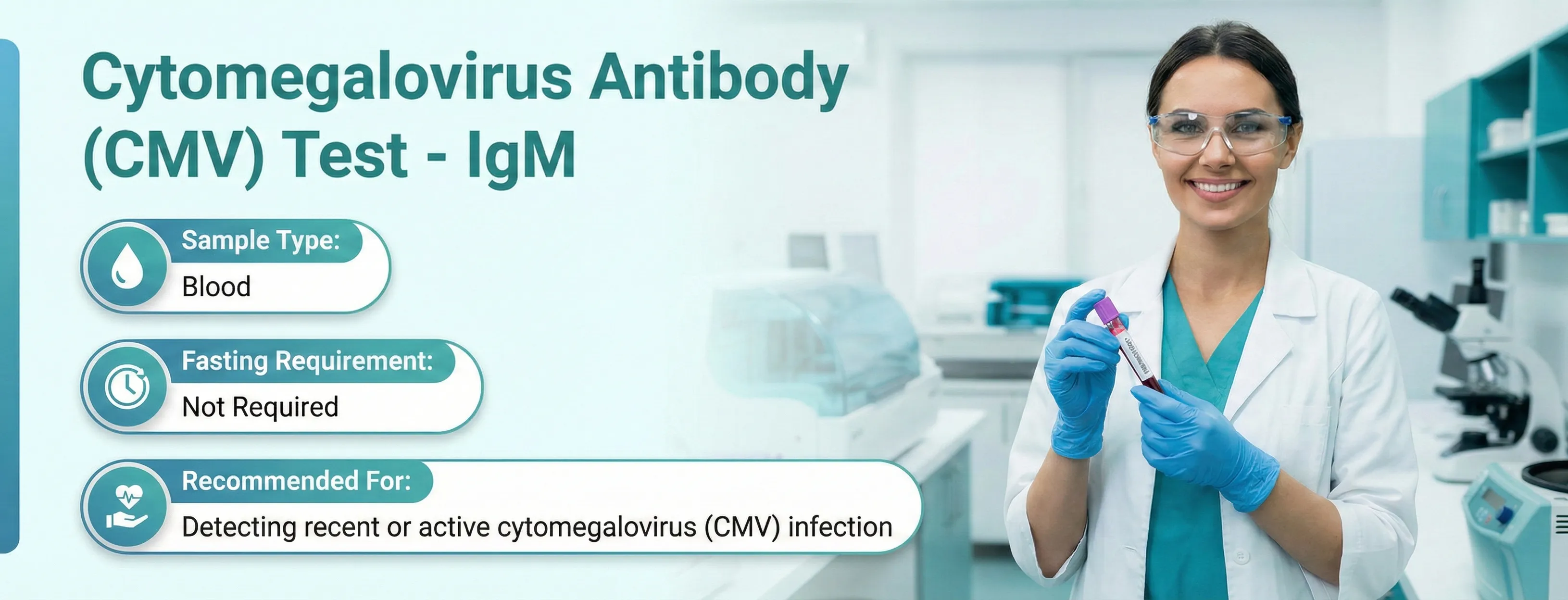12+ orders placed in your location
100% NABL & ISO Certified Lab • 100% Accurate Reports
Cytomegalovirus Antibody (CMV) Test - IgM
Cytomegalovirus Serologic IgM Test, Cytomegalovirus IgM Antibody Test, CMV IgM Antibody, CMV IgM Blood Test
- SummaryThe CMV IgM test detects IgM antibodies against Cytomegalovirus, indicating a recent or active CMV infection. It is especially important in pregnancy, as CMV can be passed to the fetus, and in immunocompromised individuals. The test is done using a blood sample, and fasting is not required.Read more
- Reports Within15 HrsView Sample Report100% NABL & ISO Certified Labs
- SampleBlood
- AgeAll Age Group
- GenderMale and Female
- FastingNot Required
PharmEasy Promises
Know More About The Test
A quick info on Cytomegalovirus Antibody (CMV) Test - IgM
Sample Type
A blood sample is required for this test. A healthcare professional or lab technician will draw a blood sample from a vein using a sterile needle. About 2-3 mL of blood is drawn.
CMV antibody IgM Test Preparation
No test preparation is required. If any other samples are to be used for the diagnosis, the health care professional or your doctor will give you instructions for the same. It doesn't need any fasting.
The usual way to collect a blood sample is by drawing it from one of the veins. This vein is usually the most prominent one in the forearm of a person. This procedure lasts for five minutes.
CMV Antibody IgM Test Inclusions: What Parameters Are Included in the CMV IgM Antibody Test?
This procedure is used to detect the presence of IgM antibodies in response to the Cytomegalovirus. When the virus enters the body, it produces an antibody response.
No other parameters are tested in this test.
How Frequently Should You Take CMV Antibody IgM Test?
- The CMV antibody IgM test is prescribed if there is a possibility of a recent or re-infection.
- You need to retake the CMV antibody IgM test again in 2 weeks if there is a reason for the doctor to believe that there is a possibility of re-infection.
- This test is not part of a regular health check-up.
Risk Assessment
Chickenpox, Herpes simplex, Mononucleosis
Test Result Interpretation
Typically, the CMV IgM Antibody test results are interpreted in conjunction with the results of the CMV IgG antibody test.
- If both CMV IgG and CMV IgM are negative: it indicates no current or prior infection.
- If CMV IgG is positive and CMV IgM is negative: it indicates past exposure to the virus.
- If CMV IgG is negative and CMV IgM is positive: it indicates a recent infection that was active, or it may also indicate re-exposure to CMV or a latent stage of the disease.
- If both CMV IgG and CMV IgM are positive: it indicated active primary infection or re-infection that was latent but is now active again.
Overveiw
CMV (Cytomegalovirus) is a common virus. It belongs to the herpes family. CMV is an infection that is widespread in many areas, but the symptoms are not severe. In most people, a mild illness develops with almost no symptoms. Some may experience mild symptoms such as sore throat, mild fever, tiredness, swollen glands, malaise, etc.
Serological testing is widely used in the diagnosis of CMV. This type of test is called a Multiplex Flow Immunoassay (MFI). The type of specimen required for the test is the patient’s serum (serum is the liquid component of blood after all cells like RBC, WBCs, and platelets are removed). The CMV antibody IgM test detects the presence of CMV antibody in the patient’s serum and is then used for the diagnosis of a CMV infection.
Antibodies are a natural immune response of the body to fight off infection. When the virus enters the body, antibodies are formed (IgM and IgG). The IgM antibodies are the first to appear in the sample. Their presence can be evaluated a week or two after the initial exposure to CMV through the CMV antibody IgM test results.
The level of IgM antibodies declines after two weeks, after which they are not detectable in the blood. The range of IgG antibodies rises after the first two weeks.
CMV especially causes major health concerns in pregnant women and newborn infants. Women who contract the infection during their pregnancy have a high chance of passing it on to the foetus. The CMV antibody IgM test helps in preventing congenital CMV in the newborn baby.
CMV is also a major cause for concern for immunocompromised individuals. This may include people who have undergone bone marrow transplants or organ transplants, etc.
Thus, it may prove to be fatal for people with weakened immune systems.
Doctors recommend this type of testing as it is one of the most accurate methods and provides fast and satisfactory results of either positive or negative very clearly.
CMV spreads through blood, urine, saliva, semen, breast milk, etc. It is particularly prominent in certain parts of the United States, where most people acquire the infection by the time they turn 40 years of age. Most people retain the virus in their bodies and do not even show any symptoms.
In India, the prevalence of this disease is up to 80-90%. This means that this amount of the adult population in India has antibodies for the virus.
Other Names of CMV IgM Antibody IgM Test
- Cytomegalovirus serologic IgM test
- Cytomegalovirus IgM antibody test
- CMV IgM antibody
What Does The CMV IgM Antibody Test Measure and Who is It Prescribed For?
CMV antibody IgM test measures the levels of IgM antibodies in the serum of individuals who have been infected with CMV.
It is usually prescribed if one of the following conditions is suspected by the doctor:
- Chickenpox
- Herpes simplex
- Mononucleosis
This test may be asked when a person with weak immunity or a pregnant female shows flu-like symptoms.
These include
- Fever
- Sore throat
- Malaise
- Fatigue
- Swollen lymph nodes
Further, CMV antibody IgM is used in the diagnosis of
- People who have a current CMV infection or those who have had it in the past but are at risk of re-infection or developing the disease again.
- Newborns where there is reason to believe there would be a congenital disease when a baby shows certain typical signs such as jaundice or spleen or liver enlargement, etc. or if it shows developmental abnormalities.
- Healthcare practitioners who have been monitoring a patient closely.
- A person who has had a bone marrow or organ transplant.
Was This Test Information Helpful?
Please rate your experience
References
People Also Ask
What does CMV IgM positive mean?
What is a CMV antibody test for?
How long is IgM positive in CMV?
What happens if you are CMV-positive?
Is CMV a sexually transmitted disease (STD)?
Have any doubts? Ask us.
Ask us anything about the Cytomegalovirus Antibody (CMV) Test - IgM to understand it better
Explore More at PharmEasy
Top-Selling Healthcare Products
Top-Searched Medicines
We provide trusted, expert-curated health content to support better awareness,prevention, and care.
Backed by experienced doctors, medical experts, and strict editorial standards.

